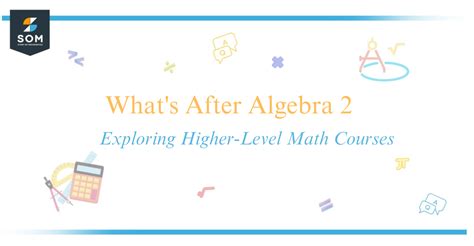College Preparatory Mathematics
After Algebra 2, students typically progress to college preparatory mathematics courses. These courses lay the foundation for future study in science, technology, engineering, and mathematics (STEM) fields.

Precalculus
Precalculus is a gateway course to calculus. It covers topics such as:
- Functions and their graphs
- Trigonometry
- Analytic geometry
- Limits and continuity
Calculus
Calculus is the study of change. It is used in a wide variety of applications, including:
- Physics
- Engineering
- Economics
- Finance
Statistics
Statistics is the science of collecting, analyzing, and interpreting data. It is used in many fields, including:
- Business
- Medicine
- Social sciences
Advanced Mathematics Electives
In addition to college preparatory mathematics, students may also choose to take advanced mathematics electives. These courses explore more specialized topics in mathematics.
Linear Algebra
Linear algebra is the study of vectors and matrices. It is used in a variety of applications, including:
- Computer graphics
- Robotics
- Data science
Differential Equations
Differential equations are equations that involve derivatives. They are used to model a wide variety of phenomena, including:
- Population growth
- Radioactivity decay
- Fluid flow
Abstract Algebra
Abstract algebra is the study of algebraic structures, such as groups and rings. It is used in a variety of applications, including:
- Cryptography
- Coding theory
- Number theory
Career Paths in Mathematics
A degree in mathematics can lead to a wide variety of career paths. Mathematicians work in a variety of settings, including:
- Academia
- Industry
- Government
- Non-profit organizations
Future Applications of Mathematics
Mathematics is constantly evolving, and new applications are being discovered all the time. Some of the potential future applications of mathematics include:
- Artificial intelligence
- Machine learning
- Data mining
- Quantum computing
How to Choose the Right Path
The best way to choose the right path in mathematics is to talk to your teachers, counselors, and professors. They can help you assess your interests and goals and make informed decisions about your future.
Tips for Success in Mathematics
Here are a few tips for success in mathematics:
- Start early. The sooner you start learning mathematics, the better.
- Be consistent. Make sure to practice mathematics regularly.
- Don’t be afraid to ask for help. If you don’t understand something, ask your teacher, a tutor, or a friend for help.
- Be resourceful. There are many resources available to help you learn mathematics, including textbooks, websites, and online courses.
- Don’t give up. Mathematics can be challenging, but don’t give up. With hard work and dedication, you can succeed in mathematics.
Conclusion
Algebra 2 is just the beginning of your journey in mathematics. There are many more exciting and challenging topics to explore. With hard work and dedication, you can achieve your goals in mathematics and pursue a successful career in STEM.
Frequently Asked Questions
What are the most important topics in Algebra 2?
The most important topics in Algebra 2 include:
- Polynomials
- Factoring
- Rational expressions
- Quadratic equations
- Systems of equations
- Inequalities
- Functions
What are some good resources for learning Algebra 2?
There are many great resources available for learning Algebra 2, including:
- Textbooks
- Websites
- Online courses
- Tutors
What are some tips for success in Algebra 2?
Here are a few tips for success in Algebra 2:
- Start early.
- Be consistent.
- Don’t be afraid to ask for help.
- Be resourceful.
- Don’t give up.
What are some career paths for people with a degree in mathematics?
A degree in mathematics can lead to a wide variety of career paths, including:
- Academia
- Industry
- Government
- Non-profit organizations
What are some potential future applications of mathematics?
Some of the potential future applications of mathematics include:
- Artificial intelligence
- Machine learning
- Data mining
- Quantum computing
